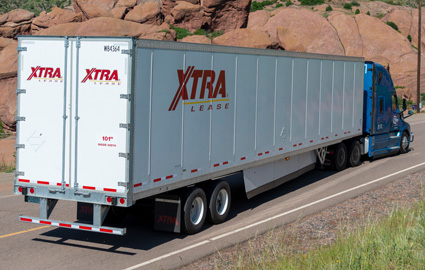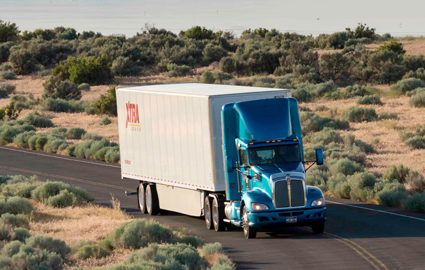
What New Trailers Do for Your Bottom Line
They can help you:
- save money
- be more efficient
- enhance your image
- retain drivers
- improve safety
- price hauls profitably
New trailers can solve old problems
To accommodate regulations, driver issues, capacity woes, operating costs, and all the other pressures on your operation, carriers continually have to do more with less. We believe the trailers you pull have a big impact on your profitability , no matter the length of your haul. And newer trailers offer the biggest potential improvement of all.
What are your freight’s traits?
What are you hauling? Who are you hauling it for? Newer trailers can effectively address big issues like these:
- Heavyweight freight
A late-model trailer with a 24,000-pound floor rating is a good match for heavier forklifts.
- Image-consciousness
Newer trailers usually look better than their elders. Looks aren’t everything, but…
- Maximum cube
You can fit an additional pallet per haul inside a late-model trailer with 101” interior width.
- Efficiency issues
New technology in trailer materials, tandem slide systems, and landing gear make late-model trailers easier to operate and keep in service.
What's bugging your business?
Newer trailers can help you with the problems you know about AND with those you haven’t thought of yet.
Here are some common issues you may have to deal with:

- You have a driver who raises a stink when he has to pull an old trailer or drive an old truck.
New trailers can help you with driver retention or with attracting new drivers to your company. What’s that worth to you?
- Maintenance on your older trailers is nickel-and-dollaring your budget to death.
New trailers have next to zero maintenance—limited mainly to PM/DOT inspections—for the first three years (depending on how many miles you run them, of course.)
- You have a trailer at an inspection station waiting for a new light assembly to replace one that got damaged at the dock.
Newer trailers, made with modern materials and methods, are less prone to incidents like this, both on the road and during the loading process. That translates to fewer breakdowns.

- You got a new contract for a time-sensitive load and scheduled a trailer. But a suspension bushing on your ten-year-old trailer just failed and the trailer will be out of service for the rest of the day.
This kind of downtime affects driver and loader productivity, sure. But downtime also makes a major impact on your customer. Your customer worked hard to earn that business…is running older trailers worth the risk of them losing it?
- You’ve been wanting to take on some new business or expand the services you offer now.
The reliable uptime of a late-model trailer can open those doors for you.
- The last contract you negotiated was tricky; pricing deals to be profitable is difficult. The more variables you have to consider, the harder it is.
Using newer trailers makes the budget process simpler and less vulnerable to change.
- You know dry vans with composite panels have more interior width than traditional sheet & post vans.
Greater width means greater freight capacity. More freight equals more money. It doesn’t take long for those extra pallets of freight to wipe out the price gap between newer and older trailers.
- A forklift driver at your biggest customer’s loading dock gouged a tunnel half the length of your trailer as he was loading pallets. You had to bill them for the repair.
No one likes to bill their customers for trailer damage! Newer trailers with damage-resistant specs, like composite panels and 12” high scuffliner, can save you worry, time, and money.
- One of your customers has so many yards, it takes your driver forever to find the trailer he’s supposed to pick up.
Late-model trailers also have the latest in trailer tracking. Inefficiencies don’t take place only in over-the-road situations. Many local haul operations have a drop-and-hook element—this is where trailer tracking can really pay off. When you use it, trailer tracking enables you to rent and lease fewer trailers and return them faster when you’re done. And preventing just one loss can save you a ton of money.
It may seem counterintuitive to you to think newer equipment has a place in your business, but you’d be doing yourself a disservice if you dismiss using newer trailers—even for your local hauls.
Once you really think about what newer trailers can do for your bottom line, it’s easier to weigh their benefits for your business.
Why not ask your vendor for a demo?
- See what you may be missing! Request a demo of a brand new trailer.
- You may also like Specs that reduce maintenance headaches.
- These trailer manufacturers have a lot to say on what makes a great trailer: Hyundai Translead, Wabash, Utility, Fontaine
